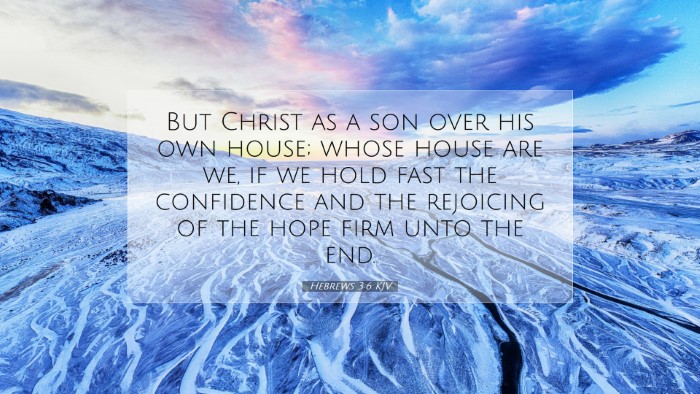Old Testament
Genesis Exodus Leviticus Numbers Deuteronomy Joshua Judges Ruth 1 Samuel 2 Samuel 1 Kings 2 Kings 1 Chronicles 2 Chronicles Ezra Nehemiah Esther Job Psalms Proverbs Ecclesiastes Song of Solomon Isaiah Jeremiah Lamentations Ezekiel Daniel Hosea Joel Amos Obadiah Jonah Micah Nahum Habakkuk Zephaniah Haggai Zechariah MalachiHebrews 3:6
Hebrews 3:6 KJV
But Christ as a son over his own house; whose house are we, if we hold fast the confidence and the rejoicing of the hope firm unto the end.
Hebrews 3:6 Bible Commentary
Hebrews 3:6 (KJV): "But Christ as a son over his own house; whose house are we, if we hold fast the confidence and the rejoicing of the hope firm unto the end."
Summary and Commentary on Hebrews 3:6
This verse encapsulates a significant theological declaration regarding the role of Christ and the nature of the believers' relationship with Him. The verse serves as a bridge, connecting the supremacy of Christ to the community of believers identified as His house. Different public domain commentaries provide distinct insights into this profound declaration.
1. The Exegesis of "But Christ as a son over his own house"
Matthew Henry emphasizes the positional authority of Christ as a Son. He notes that this designation places Christ in a unique relationship with God the Father, establishing Him as the rightful heir and ruler over the house of God. This house symbolizes the community of faith, the church, and signifies both a physical and spiritual dwelling.
Albert Barnes elaborates on this, stating that being a son over the house implies His sovereignty and governance. He asserts that Christ administers His kingdom with love and efficacy, which underscores the importance of acknowledging His authority in the life of the believer.
Adam Clarke furthers this premise by commenting on the contrast between Moses and Christ. While Moses was indeed a servant in the house, Christ is the Son. This distinction communicates that while Moses provided the law and guidance, Christ offers relationship and redemption.
2. "Whose house are we"
Henry again reiterates that the church, comprising all true believers, represents the 'house' of Christ. This notion instills a sense of belonging and identity within the framework of faith. To belong to Christ’s house is a demonstration of grace and an invitation to dwell in His presence.
Barnes further discusses this identification, arguing that it requires an active response from believers. Being part of Christ's house is conditional upon our faithfulness and obedience. This calls believers to a proactive stance in maintaining their status as members of His family.
Clarke highlights that this participation in the "house" is not merely about physical space but is deeply rooted in spiritual reality. The house signifies a collective unity among believers, illustrating the profound connection among those who share faith in Christ.
3. Importance of Holding Fast
The phrase "if we hold fast the confidence and the rejoicing of the hope firm unto the end" serves as a critical admonition. Henry notes that this exhortation underscores the necessity of perseverance in faith. To 'hold fast' indicates a continuous engagement with belief and a rejection of doubt.
Barnes expands on this idea, pointing out that "confidence" refers to the assured trust in Christ's promises. It is vital for believers to remain steadfast, as this confidence is an anchor during turbulent times. The 'rejoicing of hope' signifies not only a present joy but an expectation of future fulfillment, which encourages endurance.
Clarke asserts that the phrase highlights conditionality in the experience of salvation. He warns that assurance is temporarily tied to perseverance. Therefore, a believer's commitment and steadfastness are crucial in affirming their identity and blessing within Christ's household.
4. Theological Implications
The implications derived from Hebrews 3:6 are substantial. Firstly, this scripture reiterates the deity of Christ, asserting His role as both Son and sovereign. Henry stresses that recognizing this divine authority fosters a deeper reverence for Christ's work.
Barnes remarks on the eschatological tone of the verse, implying that believers should be motivated by a hope that transcends earthly struggles. The phrase "firm unto the end" alludes to the ultimate fulfillment of God's promises at the culmination of history.
Clarke concludes with a cautionary note, reminding believers of the peril of falling away. This verse serves as a clarion call to maintain faith rather than drifting in the face of adversity. The assurance of hope is contingent upon active, living faith throughout one's life.
5. Practical Application
For contemporary believers, Hebrews 3:6 imparts profound truths for daily spirituality. The call to hold fast confidence becomes a personal challenge for individuals and congregations to cultivate unwavering trust in God’s promises.
Henry encourages reflection on Christ's authority as a stabilizing foundation for faith, particularly amid cultural shifts. Barnes invites believers to consider their respective roles within the household of faith, fostering an environment of unity and mutual support.
Clarke motivates believers to examine their spiritual commitment and encourages active engagement in their relationship with Christ. Understanding oneself as part of His household encourages a sense of responsibility toward others in the faith community.
Conclusion
Hebrews 3:6 is a multi-faceted verse that invites deep theological reflection and practical consideration. With insights from Matthews Henry, Albert Barnes, and Adam Clarke, one can discern the rich layers of meaning inherent in this passage. As stewards of faith, believers are called to recognize their identity in Christ, holding firm to hope and encouraging one another in the journey of faith.


